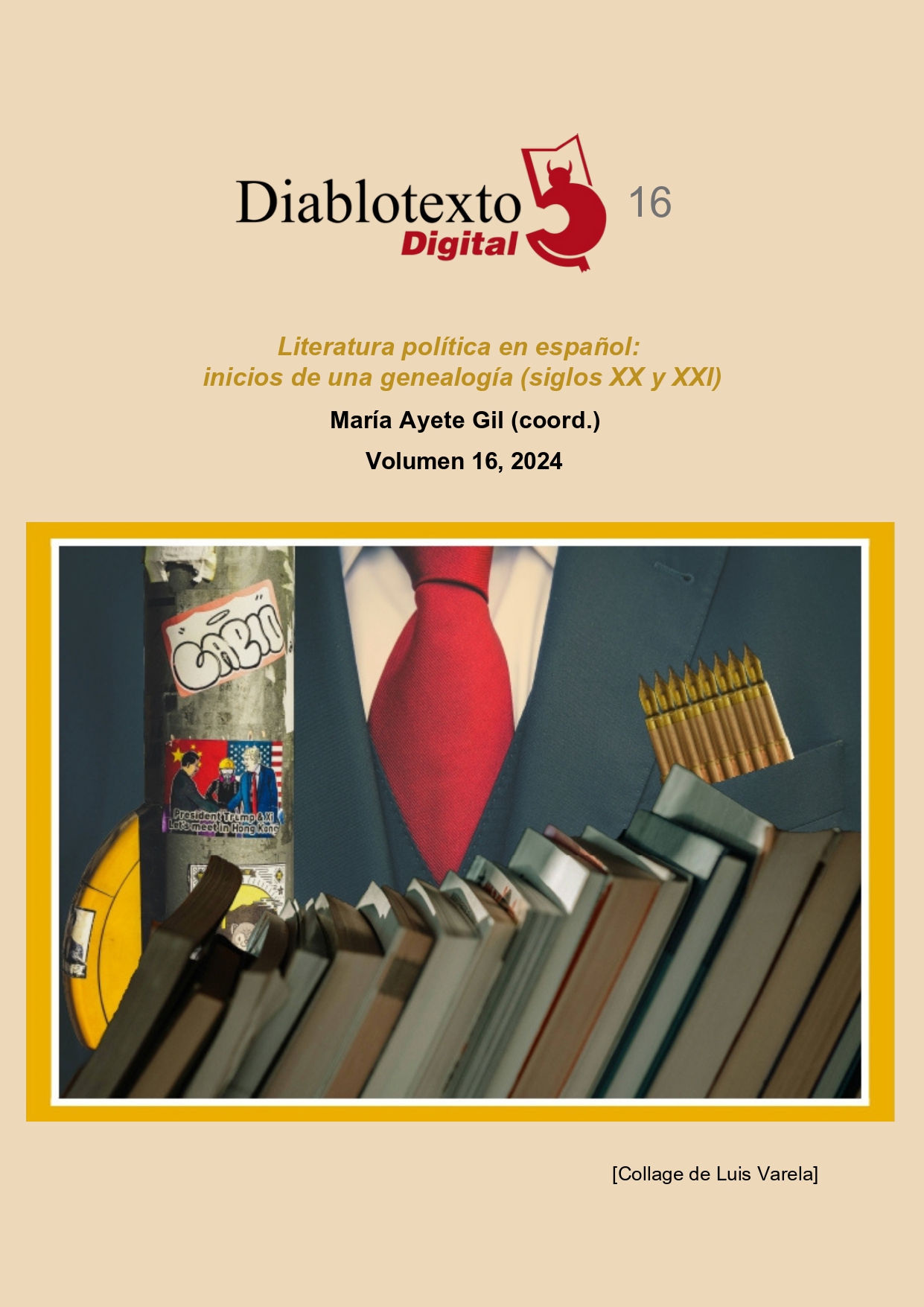Filling the Void, Twice: On William González Guevara’s Migrant and Working-Class Poetry
DOI:
https://doi.org/10.7203/diablotexto.16.29028Keywords:
William Gonzalez Guevara, working-class literature, migrant literature, current young Spanish poetry, precarious poetry Abstract
Abstract
This research focuses on the contextualization and study of William González Guevara’s (Managua, 2000) poetic work within the recent resurgence of working class narratives and the emergence of the current Spanish youth’s poetry of precariousness as a late consequence of the re-politicization of post-crisis Spanish literature. The article analyzes the shortage of migrant and working class narratives and authorships in the Spanish literary field during the last decades, in order to provide a critical perspective that allows us to recognize the ‘migrant and working class’ poetry of William González Guevara among the new “narratives for the dispute” of the current Spanish political literature.
 Downloads
Downloads
 References
References
ANDRÉS-SUÁREZ, Irene et al (eds.) (2002). La inmigración en la literatura española contemporánea. Madrid: Verbum.
AYETE GIL, María (2022). Ideología, poder y cuerpo. La novela política contemporánea. Manresa: Bellaterra.
BECERRA MAYOR, David (2013). La novela de la no-ideología, Madrid: Tierradenadie.
BECERRA MAYOR, David (2021). Después del acontecimiento: El retorno de lo político en la literatura española tras el 15-M. Manresa: Bellaterra.
BECERRA MAYOR, David y MARTÍNEZ FERNÁNDEZ, Ángela (2019). “La falta de representación de la migración ecuatoriana en la novela española actual”, Transatlantic Studies Network, n.º 8, pp. 195-209.
BORTOLI, Giulia (2019). “La representación de la mujer inmigrante en España a través del cine y la literatura española del siglo XXI”, Rassegna iberistica, n.º 42, pp. 179-188.
DELGADO, Luisa Elena (2009). La nación singular. Madrid: Siglo XXI.
GARCÍA BORREGO, Iñaki (2003). “Los hijos de inmigrantes como tema sociológico: la cuestión de ‘la segunda generación’”, Anduli: revista andaluza de ciencias sociales, n.º 3, pp. 27-46.
GARCÍA-CARDONA, Juan (2024). “El migrante como sujeto literario en dos novelas enmarcadas en la España vacía: La forastera (2020) y Un hípster en la España vacía (2020)”, Philologica Canariensia, n.º 30, pp. 175–192.
GONZÁLEZ GUEVARA, William (2022a). Los nadies. Madrid: Hiperión.
GONZÁLEZ GUEVARA, William (2022b). Me duele respirar. Granada: Valparaíso.
GONZÁLEZ GUEVARA, William (2023). Inmigrantes de segunda. Madrid: Hiperión.
GONZÁLEZ GUEVARA, William (2024). Esta será mi venganza. Madrid: Hiperión.
KUNZ, Marco (2002). “La inmigración en la literatura española contemporánea: un panorama crítico” En Irene Andres-Suárez et al. (ed.), La inmigración en la literatura española contemporánea. Madrid: Verbum, pp. 109-136.
MACÍAS, Álvaro (2022). “Twitter, precariedad y temáticas heterogéneas: la poesía joven española se mira en el espejo”, 20minutos, 12 de mayo de 2022. Disponible en: <https://www.20minutos.es/noticia/4648061/0/redes-sociales-cuidados-variedad-tematica-las-razones-del-auge-de-la-poesia-joven-espanola/> [Fecha de consulta: 13 de junio de 2024].
MARTÍNEZ FERNÁNDEZ, Ángela (2021). “Una genealogía de lo obrero en el campo cultural: Narrativas ‘de la carencia’ y ‘para la disputa’”, Orillas: Rivista D'Ispanistica, n.º 10, pp. 31-60.
MARTÍNEZ GUTIÉRREZ, Josebe (2024). “Escritoras latinoamericanas en el Norte Global. Una aproximación a la literatura emergente en español”, Mitologías Hoy. Revista de Pensamiento, Crítica y Estudios Literarios Latinoamericanos, n.º 30, pp. 215-225.
MORALES, Clara (2021). “Una nueva poesía social retrata la desesperanza de una generación criada en una crisis interminable”, Infolibre, 21 de marzo de 2021. Disponible en: <https://www.infolibre.es/cultura/nueva-poesia-social-retrata-desesperanza-rabia-generacion-criada-crisis-interminable_1_1195249.html> [Fecha de consulta: 13 de junio de 2024].
ODARTEY-WELLINGTON, Dorothy (2012). “El imaginario de la inmigración en la narrativa española contemporánea”, En Laura Silvestri et al (ed.), Rumbos del hispanismo en el umbral del Cincuentenario de la AIH, vol. 5. Roma: Bagatto Libri, pp. 461-468.
RONCAGLIOLO, Santiago (2007). “Los que son de aquí. Literatura e inmigración en la España del siglo XXI”, Quórum. Revista de pensamiento iberoamericano, n.º 19, pp.151-158.
ROSTECKA, Bárbara y ASCANIO-SÁNCHEZ, Carmen (2021). “Literatura de la inmigración en España: enfoques, discursos y análisis”, Ocnos, vol. 20, n.º 3, pp. 1-11.
SABUGAL, Noemí (2024). “Literatura con orgullo de clase trabajadora”, El País, 30 de octubre de 2024. Disponible en: <https://www.elpais.com/cultura/2024-10-30/literatura-con-orgullo-de-clase-trabajadora.html> [Fecha de consulta: 31 de octubre de 2024].
VALVERDE, Álvaro (2023). “‘Inmigrantes de segunda’: la poesía cristalina de William González Guevara, ganador del Premio Hiperión”, El Cultural, 16 de septiembre de 2023. Disponible en: <https://www.elespanol.com/el-cultural/letras/20230916/inmigrantes-segunda-poesia-cristalina-william-gonzalez-guevara-ganador-premio-hiperion/794670764_0.html> [Fecha de consulta: 31 de octubre de 2024].
VV. AA. (2022). 25 años del Premio Antonio Carvajal (1998-2022). Madrid: Hiperión.
VV. AA. (2023). Matria poética: una antología de poetas migrantes. Madrid: La imprenta.
ZOVKO, Maja (2009). “La imagen del inmigrante en la novela española actual”, Altre Modernità, n.º 2, pp. 163-172.
ZOVKO, Maja (2019). Itinerarios narrativos de la inmigración actual en España. Barcelona: Universitat Autònoma de Barcelona.
Downloads
Published
How to Cite
-
Abstract85
-
PDF (Español)30
Issue
Section
License
Licencia de reconocimiento de Creative Commons “Reconocimiento - No Comercia l- Sin Obra Derivada
Authors who publish with this journal agree to the following items:
The authors will keep their copyright and guarantee the journal the right of first publication of their work, which will be simultaneously subject to the Creative Commons license that allows third parties to share the work indicating its author and its first publication in the journal. The authors may adopt other non-exclusive license agreements to distribute the version of the published work (e.g., depositing it in an institutional telematic file or publishing it in a monographic volume), with an acknowledgment of its initial publication in this journal. The authors are allowed and encouraged to disseminate their work through the Internet (e.g., in institutional telematic archives or on their website) before and during the submission process, which can produce interesting exchanges and increase citations of the published work. (See Effect of Open Access)




